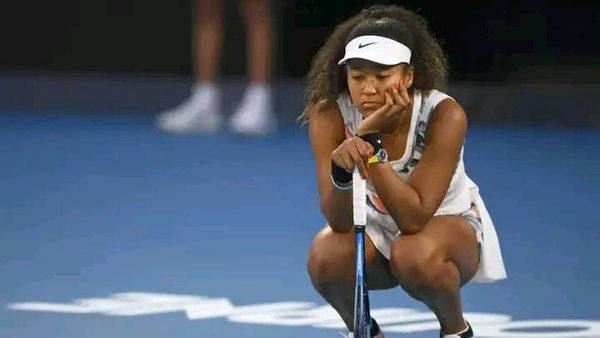In the world of professional sports, athletes often face immense pressure, not just to perform at the highest level but also to maintain their mental well-being in the spotlight. This pressure has recently come to the forefront with Naomi Osaka, one of tennis’s brightest stars, as she battles emotional struggles amid her decision to step back from the sport.
Osaka, who has been a force in women’s tennis, capturing four Grand Slam singles titles and becoming the first Asian player to hold the World No. 1 ranking, announced in 2022 that she would be taking an indefinite break from tennis. Since then, her absence from the game has raised concerns, not only for her fans but for those who see her as one of the most impactful athletes of her generation.
Osaka’s Rise to Fame
Naomi Osaka’s journey to the top of tennis was nothing short of meteoric. Born in Japan to a Haitian father and a Japanese mother, Osaka became a symbol of diversity and global unity in the sport. Her rise was marked by her resilience and mental fortitude, especially during key moments like her back-to-back wins at the US Open in 2018 and 2020, where she faced challenges both on and off the court.
Her poise and ability to overcome adversity captivated fans worldwide. However, it wasn’t just her performances that made her a role model—it was her advocacy for mental health. Osaka opened up about her struggles with anxiety and depression in 2021, a decision that sparked a broader conversation about mental health in professional sports. Her willingness to speak out set a precedent for other athletes, highlighting the need for mental wellness resources within elite sports.
In early 2022, Osaka made the difficult decision to take a break from tennis, citing her need to focus on her well-being. She shared that the demands of the sport and the constant media attention had taken a toll on her mental health, and she wanted to step back to reconnect with herself. It was a courageous decision, one that many commended as a reminder that taking care of mental health is just as important as physical health.
Since then, Osaka has kept a relatively low profile in the media, occasionally updating her fans on her personal growth journey through social media posts and interviews. She has been seen enjoying her time off with her family and focusing on various non-tennis projects, such as launching her own skincare line and engaging in philanthropic work. However, it’s clear that her emotional struggles persist as she continues to grapple with the complexities of being in the public eye.
Emotional Struggles Amidst the Break
Despite her efforts to focus on herself, Osaka’s emotional struggles have not dissipated entirely. In recent interviews, she has opened up about the challenges of dealing with the expectations that come with being a global sports icon. The pressure of maintaining her high performance and the scrutiny surrounding her personal life have been difficult for her to manage, especially as she contemplates her future in tennis.
Osaka has been particularly vocal about the difficulty of balancing her mental health with the pressure to succeed in a sport that demands perfection. “I’ve been battling a lot of emotions,” Osaka admitted. “It’s hard to articulate sometimes because you don’t want to let people down. But there are days when everything feels too overwhelming, and you just want to take a step back.” Her honesty has resonated with many of her fans, who continue to support her as she takes the time she needs to heal.
The emotional toll of being in the limelight, coupled with the strain of trying to return to tennis after a break, has left Osaka uncertain about her next steps. Although she has not officially announced her retirement, it remains unclear when—or if—she will return to the sport that made her famous.
Support and Understanding from the Tennis Community
The tennis community has rallied around Osaka during this time, offering their support and understanding. Fellow players, coaches, and fans have shown empathy towards her struggles, with many acknowledging that mental health should always come first. Renowned figures such as Serena Williams and Billie Jean King have expressed their solidarity, emphasizing the importance of taking time for oneself and prioritizing well-being over performance.
Tennis governing bodies like the WTA and ATP have also worked to create more supportive environments for players, especially when it comes to mental health. The ongoing conversation around mental health in sports has led to increased resources, including access to therapists and mental health professionals, for players facing similar struggles.
Looking Ahead
As for the future, Naomi Osaka’s fans and the broader tennis community remain hopeful that she will find the strength and support she needs to eventually return to the sport. Her talent and achievements have left an indelible mark on tennis, and many believe that she has the potential to continue making an impact on and off the court.
However, no one can predict when, or if, Osaka will decide to make her comeback. For now, the focus is on her health and well-being, and the world is watching and waiting, sending her love and support as she navigates through this challenging chapter of her life.
One thing is certain: Osaka’s transparency about her struggles has helped break down the stigma surrounding mental health in sports, opening the door for other athletes to share their experiences. Her decision to prioritize her emotional health, while difficult, is a powerful reminder that mental well-being should always come first.
Naomi Osaka’s break from tennis has been marked by emotional challenges that highlight the difficulty athletes face in balancing their public personas with their private lives. While she has made strides in using her platform to discuss mental health, the road ahead remains uncertain for the tennis star. Fans and the tennis community continue to support her, hoping that she finds peace and the strength to one day return to the sport she loves. Until then, her journey will serve as an important example of the need for empathy, understanding, and care in the high-pressure world of professional athletics.





